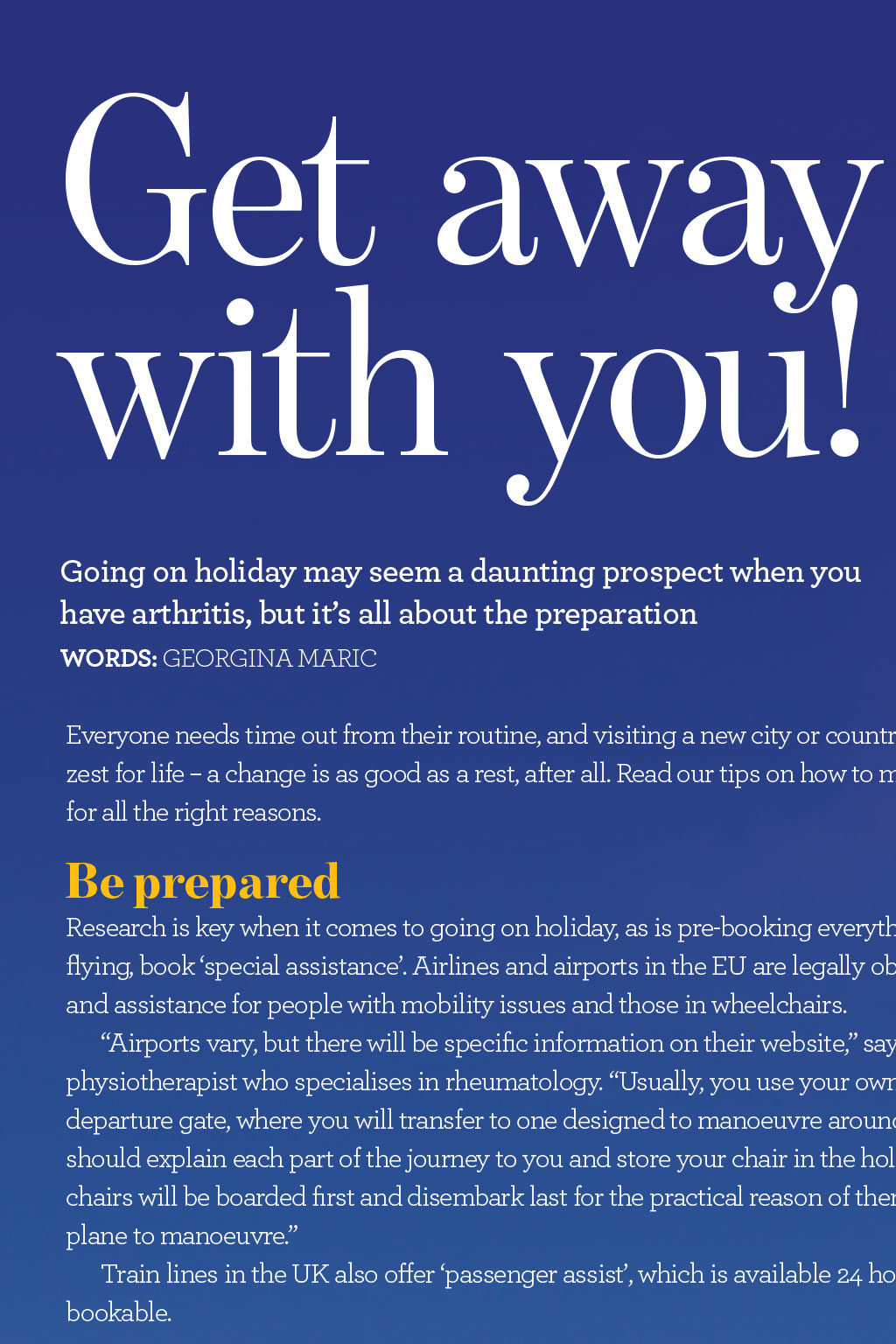

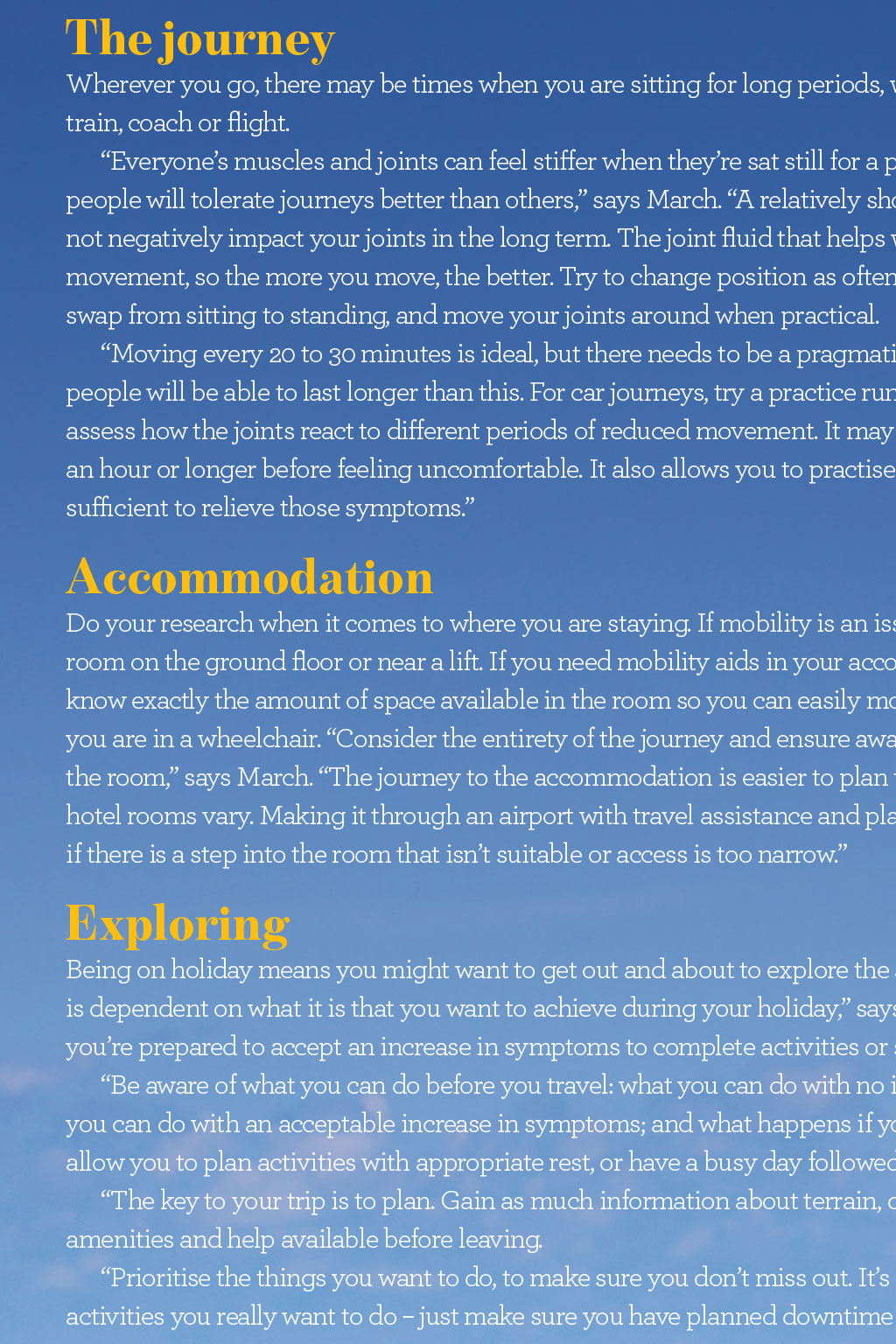
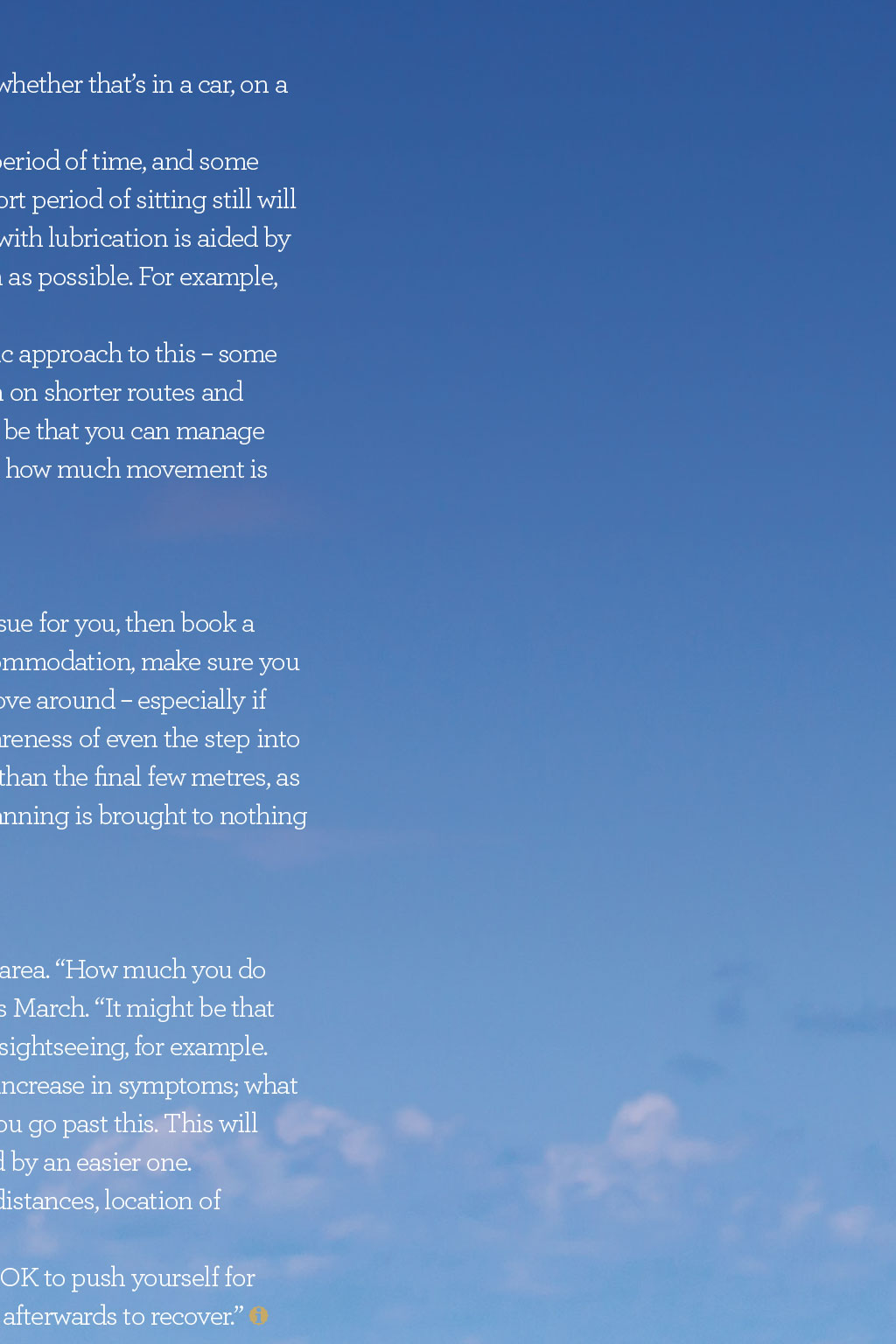
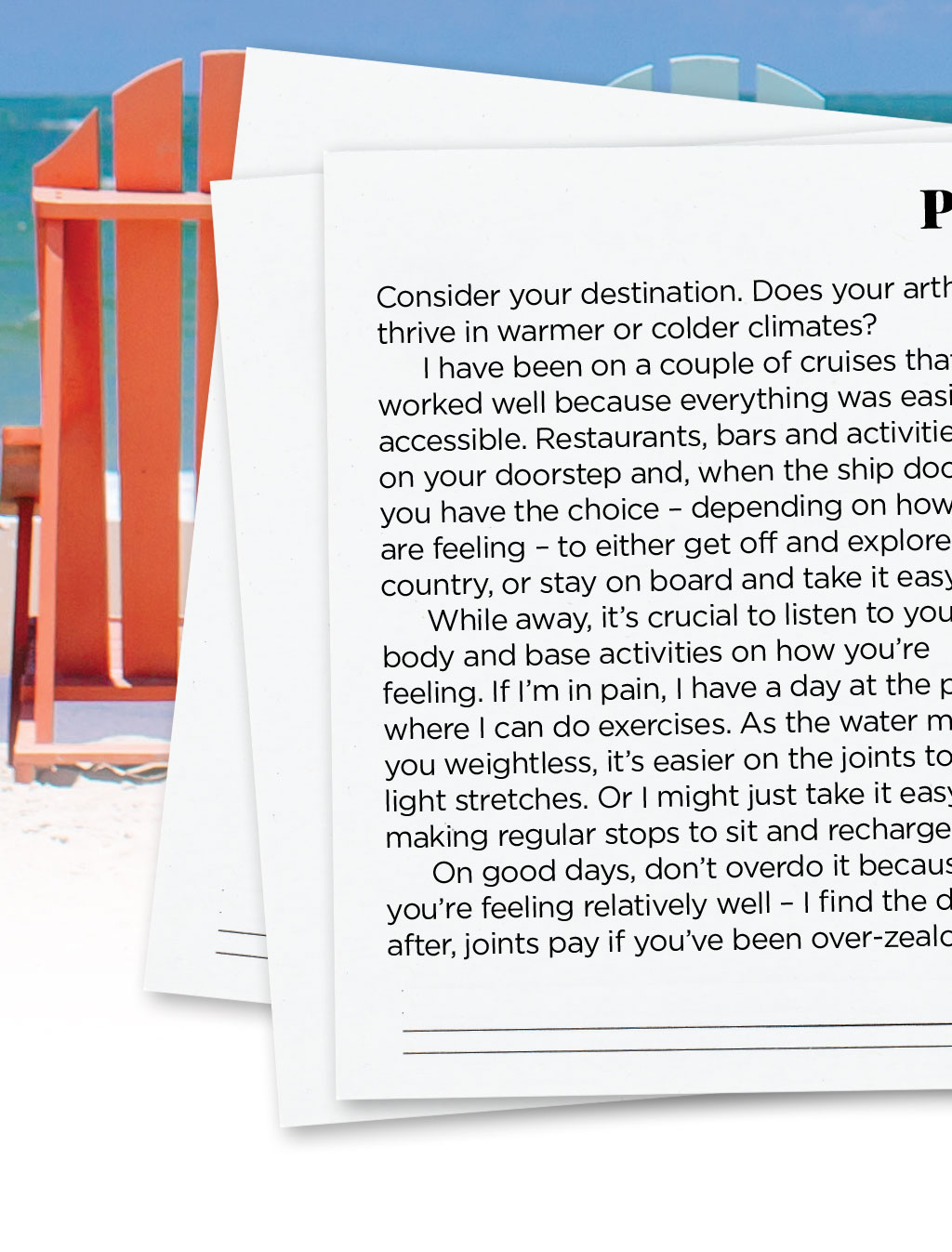
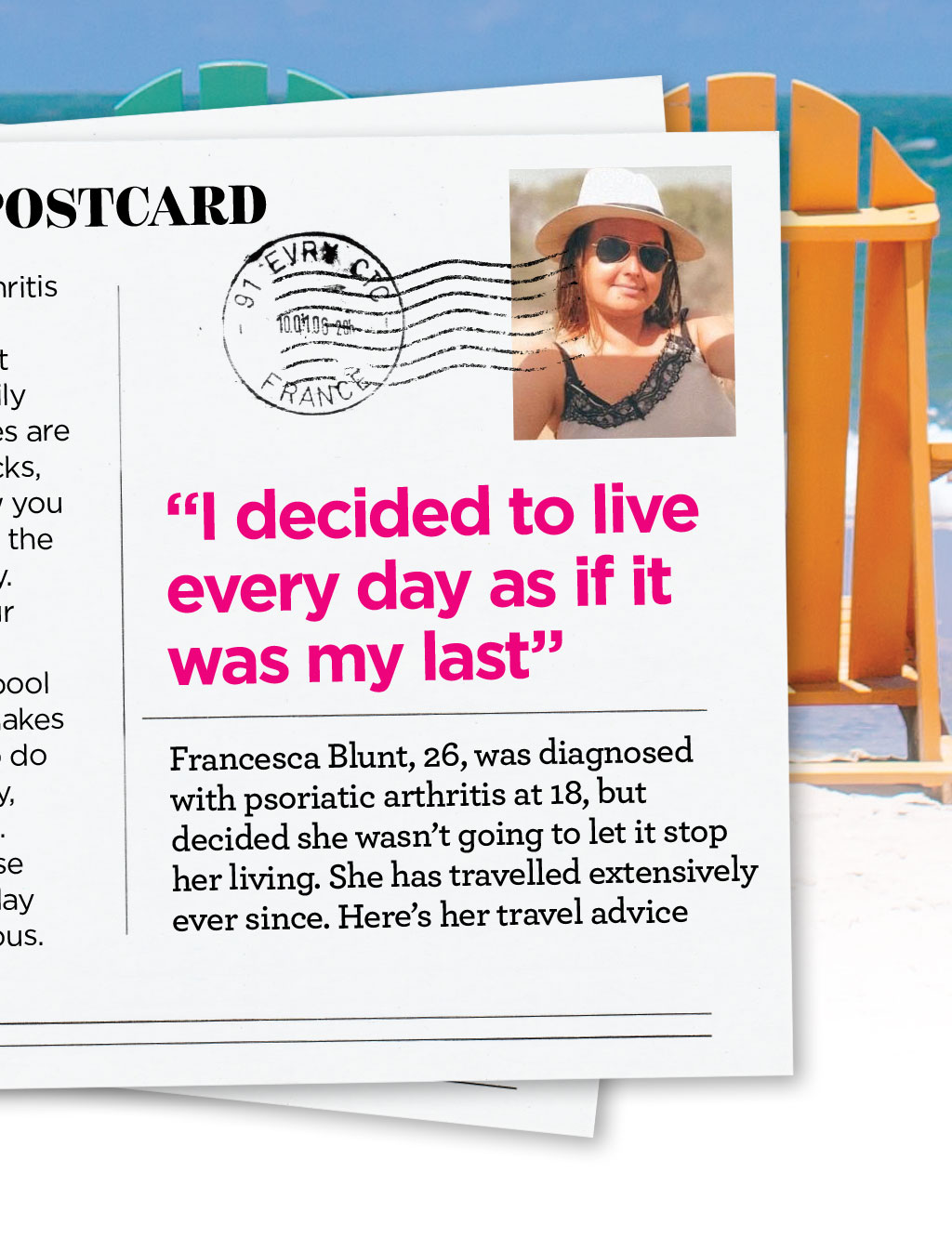







Get away with you! Going on holiday may seem a daunting prospect when you have arthritis, but it’s all about the preparation WORDS: GEORGINA MARIC Everyone needs time out from their routine, and visiting a new city or country can give you a renewed zest for life – a change is as good as a rest, after all. Read our tips on how to make holidays memorable for all the right reasons. Be prepared Research is key when it comes to going on holiday, as is pre-booking everything you can. If you are flying, book ‘special assistance’. Airlines and airports in the EU are legally obliged to provide free help and assistance for people with mobility issues and those in wheelchairs. “Airports vary, but there will be specific information on their website,” says Jack March, a physiotherapist who specialises in rheumatology. “Usually, you use your own wheelchair until the departure gate, where you will transfer to one designed to manoeuvre around the plane. The airport staff should explain each part of the journey to you and store your chair in the hold. Normally, travellers with chairs will be boarded first and disembark last for the practical reason of there being more space on the plane to manoeuvre.” Train lines in the UK also offer ‘passenger assist’, which is available 24 hours a day and is pre- bookable. The journey Wherever you go, there may be times when you are sitting for long periods, whether that’s in a car, on a train, coach or flight. “Everyone’s muscles and joints can feel stiffer when they’re sat still for a period of time, and some people will tolerate journeys better than others,” says March. “A relatively short period of sitting still will not negatively impact your joints in the long term. The joint fluid that helps with lubrication is aided by movement, so the more you move, the better. Try to change position as often as possible. For example, swap from sitting to standing, and move your joints around when practical. “Moving every 20 to 30 minutes is ideal, but there needs to be a pragmatic approach to this – some people will be able to last longer than this. For car journeys, try a practice run on shorter routes and assess how the joints react to different periods of reduced movement. It may be that you can manage an hour or longer before feeling uncomfortable. It also allows you to practise how much movement is sufficient to relieve those symptoms.” Accommodation Do your research when it comes to where you are staying. If mobility is an issue for you, then book a room on the ground floor or near a lift. If you need mobility aids in your accommodation, make sure you know exactly the amount of space available in the room so you can easily move around – especially if you are in a wheelchair. “Consider the entirety of the journey and ensure awareness of even the step into the room,” says March. “The journey to the accommodation is easier to plan than the final few metres, as hotel rooms vary. Making it through an airport with travel assistance and planning is brought to nothing if there is a step into the room that isn’t suitable or access is too narrow.” Exploring Being on holiday means you might want to get out and about to explore the area. “How much you do is dependent on what it is that you want to achieve during your holiday,” says March. “It might be that you’re prepared to accept an increase in symptoms to complete activities or sightseeing, for example. “Be aware of what you can do before you travel: what you can do with no increase in symptoms; what you can do with an acceptable increase in symptoms; and what happens if you go past this. This will allow you to plan activities with appropriate rest, or have a busy day followed by an easier one. “The key to your trip is to plan. Gain as much information about terrain, distances, location of amenities and help available before leaving. “Prioritise the things you want to do, to make sure you don’t miss out. It’s OK to push yourself for activities you really want to do – just make sure you have planned downtime afterwards to recover.” Self Tips from those in the know Consider your destination. Does your arthritis thrive in warmer or colder climates? I have been on a couple of cruises that worked well because everything was easily accessible. Restaurants, bars and activities are on your doorstep and, when the ship docks, you have the choice – depending on how you are feeling – to either get off and explore the country, or stay on board and take it easy. “I decided to live every day as if it was my last” While away, it’s crucial to listen to your body and base activities on how you’re feeling. If I’m in pain, I have a day at the pool where I can do exercises. As the water makes you weightless, it’s easier on the joints to do light stretches. Or I might just take it easy, making regular stops to sit and recharge. Francesca Blunt, 26, was diagnosed with psoriatic arthritis at 18, but decided she wasn’t going to let it stop her living. She has travelled extensively ever since. Here’s her travel advice On good days, don’t overdo it because you’re feeling relatively well – I find the day after, joints pay if you’ve been over-zealous. POSTCARD Tips from those in the know Read our readers’ suggestions for better holidays People tend to give you a wider berth if you use a walking stick or crutches, which can be useful in crowded spaces like airports and stations. Always use a small backpack to carry stuff. Jeremy Latham Airport assistance is great, but make sure to book it. Put your meds in your hand luggage and carry a letter from your doctor to show security if they ask. Check if drugs are illegal in other countries – codeine is illegal in Greece, for example, so don’t get caught out. And get good travel insurance. Catherine Manning If your meds need refrigerating, then think about taking small, specialist cool bags. I always take my memory foam neck pillow as it makes such a difference. Lynn Laidlaw Wear supportive shoes for walking – the best you can afford – and a pair of nice soft socks, even when it’s hot! Keep biscuits or crackers in your hotel room so you have something to take your meds with if you forget them at regular meal times. Gemma Bristow n Source: Versus Arthritis Twitter